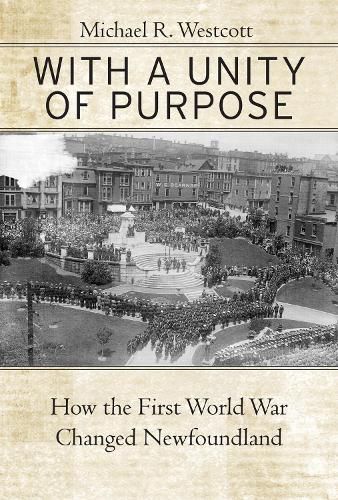Readings Newsletter
Become a Readings Member to make your shopping experience even easier.
Sign in or sign up for free!
You’re not far away from qualifying for FREE standard shipping within Australia
You’ve qualified for FREE standard shipping within Australia
The cart is loading…






In 1914, the Dominion of Newfoundland found itself at war in defense of the British Empire. On the home front, the war effort reshaped the relationship between citizens and the state, moving from a classical liberalism that emphasized individual rights to a social liberalism that prioritized the rights of the community.
The First World War was felt keenly in Newfoundland - in economic hardship, fears of foreign invasion, and anxieties over the fate of loved ones. When the government insisted that all military-aged men owed a duty to enlist with the Newfoundland Regiment, and as it increasingly depended on women's domestic work, citizens expected that their service would be rewarded through measures to ensure security and equality on the home front. There was widespread public support for a range of government interventions, including food rationing and price control, prohibition of the sale of alcohol, higher taxes, initiatives to protect against German spies, and military conscription if necessary. By the end of the war, support for women's suffrage had also grown substantially, in acknowledgment of their major contribution to the war effort.
With a Unity of Purpose is the first book to examine how wartime Newfoundland and Labrador began to be remade in the image of social liberalism, in which citizens and the state recognized not only their individual rights but their responsibilities to each other.
$9.00 standard shipping within Australia
FREE standard shipping within Australia for orders over $100.00
Express & International shipping calculated at checkout
In 1914, the Dominion of Newfoundland found itself at war in defense of the British Empire. On the home front, the war effort reshaped the relationship between citizens and the state, moving from a classical liberalism that emphasized individual rights to a social liberalism that prioritized the rights of the community.
The First World War was felt keenly in Newfoundland - in economic hardship, fears of foreign invasion, and anxieties over the fate of loved ones. When the government insisted that all military-aged men owed a duty to enlist with the Newfoundland Regiment, and as it increasingly depended on women's domestic work, citizens expected that their service would be rewarded through measures to ensure security and equality on the home front. There was widespread public support for a range of government interventions, including food rationing and price control, prohibition of the sale of alcohol, higher taxes, initiatives to protect against German spies, and military conscription if necessary. By the end of the war, support for women's suffrage had also grown substantially, in acknowledgment of their major contribution to the war effort.
With a Unity of Purpose is the first book to examine how wartime Newfoundland and Labrador began to be remade in the image of social liberalism, in which citizens and the state recognized not only their individual rights but their responsibilities to each other.